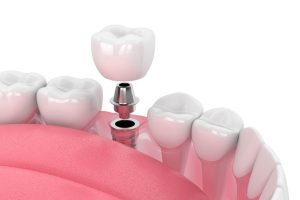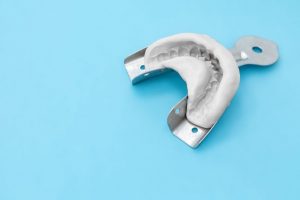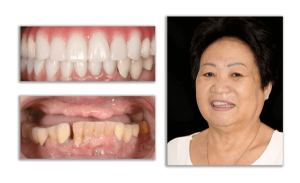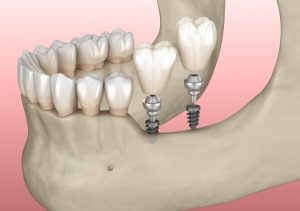Table of content
- 1. Are Dental Implants Uncomfortable? Are They Risky?
- 2. Should You Choose Dental Implants or Dental Bridges for Missing Teeth?
- 3. Who Should Consider Getting Dental Implants?
- 4. Are Dental Implants Suitable for Middle-Aged and Elderly Patients?
- 5. What Should You Prepare Before Getting Dental Implants?
- 6. Where to Get High-Quality and Safe Dental Implants
- 7. How to Properly Care for Your Teeth After Getting Dental Implants
Dental implants are currently the most advanced solution for replacing missing teeth and are highly regarded in modern dentistry. However, many people still hesitate when deciding whether to proceed with dental implants. In this article, Elite Dental addresses seven frequently asked questions about dental implants, providing a comprehensive overview to help you make an informed decision.
1. Are Dental Implants Uncomfortable? Are They Risky?
The level of discomfort experienced during dental implant placement depends on the patient’s physical condition and pain tolerance. At Elite Dental, many patients have shared that they did not feel any pain during the procedure, while some reported mild discomfort following the implant placement surgery.
Typically, implant placement involves inserting a titanium post into the jawbone. This process often raises concerns about potential pain. However, there is no need to worry excessively. Modern technologies significantly reduce trauma, minimize swelling, and accelerate healing. Notable advancements include implant placement assistance devices, Piezo surgery tools, and PRP centrifuge systems.
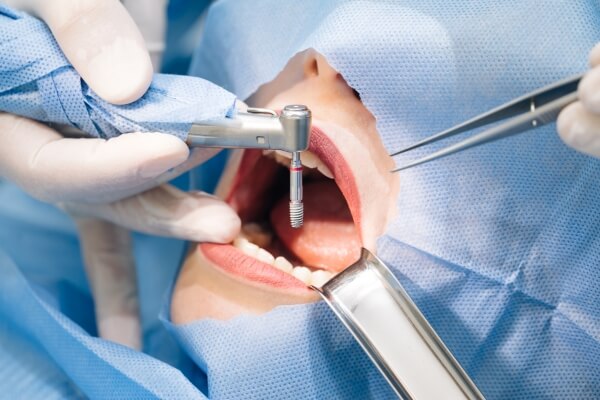
Moreover, whether the procedure causes discomfort also depends on various factors such as the patient’s condition and the dentist’s expertise. The dentist’s skill level plays a crucial role in minimizing pain and reducing the risk of complications (e.g., infections or implant rejection).
For a smooth, comfortable, and safe implant experience, patients are advised to choose a reputable dental center with a team of highly experienced dentists.
Tips for you: >> Does Getting Dental Implants Hurt? What Factors Influence the Pain? >> Is Dental Implantation Dangerous? Potential Complications You May Encounter
2. Should You Choose Dental Implants or Dental Bridges for Missing Teeth?
Aside from dental implants, dental bridges are another popular method for replacing missing teeth. So, which option is the best for restoring your smile?
Criteria | Dental Implants | Dental Bridges |
| Definition | Uses a titanium post embedded into the jawbone to replace the root of the missing tooth. | Requires the adjacent teeth to be filed down to serve as support for the bridge, which covers the missing area. This process can damage the natural tooth structure, leading to potential inflammation, weakening, and eventual tooth loss over time. |
| Suitable Candidates | Ideal for individuals missing one tooth, multiple teeth, or an entire arch. | Suitable for those missing 1–3 adjacent teeth or a few teeth scattered in different areas. Note: Dental bridges are only appropriate if the adjacent teeth are healthy and free from dental issues. |
| Aesthetics | Both methods offer high aesthetic results, with the restored teeth appearing naturally white and beautiful. | |
| Chewing Function | Restores up to 90% of chewing ability, allowing comfortable eating, similar to natural teeth. | Provides strong chewing capability but not as robust as implants. It is recommended to avoid extremely hard or chewy foods to prevent damaging the bridge. |
| Prevention of Bone Loss | Since the implant replaces the tooth root, it helps prevent jawbone loss. | Bridges only replace the visible part of the tooth, leaving the root empty and unable to prevent bone loss. Over time, this can cause facial changes, such as sagging or protrusion, accelerate skin aging, and make future restorations more challenging. |
| Durability | Lasts 25 years to a lifetime. | Lasts 7–10 years. |
As seen above, dental implants provide superior results in terms of chewing function and oral health. After undergoing the implant procedure, patients can enjoy eating as they would with natural teeth, avoid bone loss, preserve adjacent teeth, and maintain facial aesthetics.
Therefore, when considering tooth restoration, dental implants are highly recommended to achieve the best possible outcome.
Tips for you: >> Dental Implants Procedure: All Steps You Need To Know >> How long does dental implant surgery take and what factors affect it? >> 12 Advantages and Disadvantages of Dental Implants You Should Know
3. Who Should Consider Getting Dental Implants?
Dental implants are recommended for the following cases:
- Teeth that are severely damaged due to conditions such as tooth decay or periodontitis.
- Long-term tooth loss.
- Missing multiple teeth or an entire arch of teeth.
- Weak teeth that cannot support a dental bridge.
Cases Where Dental Implants Are Not Recommended:
- Pregnant women.
- Patients under the age of 18.
- Individuals with infections in the area intended for implant placement.
- People with mental health disorders, frequent stress, or those unable to control their behavior.
4. Are Dental Implants Suitable for Middle-Aged and Elderly Patients?
The good news is that older adults can restore their missing teeth with dental implants. However, before proceeding, a comprehensive general health and oral health evaluation is necessary. If any underlying conditions are well-managed and test results are within acceptable ranges, dental implants can be a viable solution for restoring teeth.
5. What Should You Prepare Before Getting Dental Implants?
To ensure a smooth and successful dental implant procedure, patients should carefully consider the following aspects:
Choosing a reputable dental clinic is essential: A trustworthy dental clinic should have a team of highly experienced, professionally certified dentists with the necessary licenses. The clinic should also be equipped with advanced technology, use high-quality, authentic implant posts, and meet safety standards certified by the Ministry of Health.
Where is a good place to have wisdom teeth removed is a question that many people are interested in today. Wisdom teeth (also known as tooth number 8) grow between 18 and 20 years old. However, there are cases where wisdom teeth grow at 14-15 years old, causing pain and…
Maintaining a relaxed mindset is equally important: Patients are encouraged to take time to rest and keep a calm and positive attitude. Avoiding excessive stress can help both the patient and the dentist feel more comfortable during the procedure. A relaxed patient allows the dentist to perform the implant placement more smoothly and efficiently.
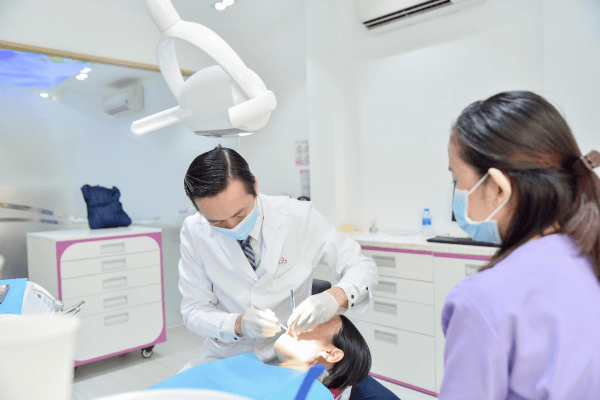
Keeping your health in optimal condition is crucial: Patients should prioritize maintaining their overall well-being, especially those with underlying health conditions. This helps ensure the procedure is carried out safely and smoothly.
Avoiding alcohol and tobacco is vital before and after the dental implant procedure: Substances in cigarettes and alcohol can negatively impact the gums, hinder the healing process, and increase the risk of implant rejection following surgery.
6. Where to Get High-Quality and Safe Dental Implants
Elite Dental is a trusted and high-quality destination for dental implants, making it the top choice for many individuals seeking to restore missing teeth with this advanced method.
At Elite Dental, the team of dentists boasts exceptional expertise with over 15 years of experience in implant dentistry, led by Dr. Tran Hung Lam, Ph.D. The clinic has successfully performed thousands of dental implant cases, helping patients achieve their dream smiles and improve their oral health.
For patients with total tooth loss, Elite Dental has successfully applied the ProArch/All-on-X technique for full-arch restorations. This technique, supported by scientific research conducted by Dr. Tran Hung Lam and published in the Journal of Dental Implant Research (JDIR)—a renowned and prestigious scientific journal in the field of dental implants—demonstrates outstanding results. The study showed a 98.94% implant compatibility rate over three years and a 100% success rate for permanent full-arch restorations.
This achievement offers hope to individuals with complete tooth loss, enabling comprehensive and optimal restoration while minimizing the need for complex procedures such as bone grafts or sinus lifts, especially when addressed early after tooth loss.
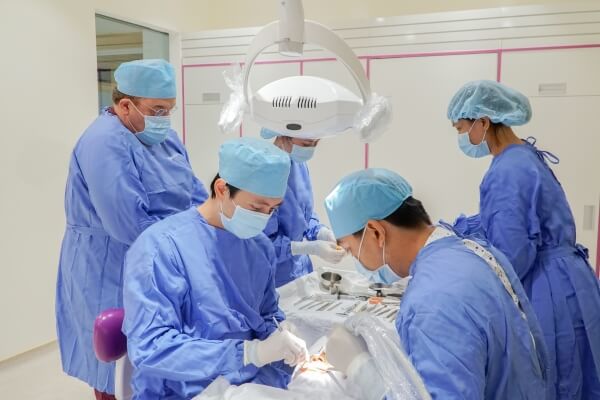
Additionally, the clinic is equipped with state-of-the-art technology that ensures a smooth, efficient, and precise implant process.Operating under an “all-in-one clinic” model, Elite Dental provides integrated services such as imaging, testing, and minor surgeries on-site, offering convenience and efficiency for patients undergoing treatment.
Contact Elite Dental today to receive detailed advice about dental implant procedures HERE.
7. How to Properly Care for Your Teeth After Getting Dental Implants
Proper oral care after receiving dental implants is crucial to ensure their durability and long-term success. Here are essential tips to follow:
- If you experience pain or discomfort, take pain relievers as prescribed by your dentist and apply cold compresses to reduce swelling.
- Drink plenty of water to keep your mouth clean and soothe the treated area.
- Avoid tough, hard, excessively hot, or cold foods. Opt for soft foods and include nutrients like calcium, vitamin C, and vitamin D in your diet.
- Use a water flosser to clean between teeth and consider anti-plaque solutions to eliminate bacteria and minimize negative impacts on your implants.
- Choose toothpaste designed for sensitive teeth that contains stannous fluoride or neutral fluoride to protect the metal implant without causing wear.
- Refrain from strenuous physical activities, as these can interfere with the stability of the new implants.
- Schedule dental check-ups every six months or visit your dentist immediately if you notice any unusual issues with your implants to ensure optimal oral health.
This article provides answers to the common question: “Should I get dental implants?” With this information, we hope you have a clearer understanding of dental implants and can confidently choose a trustworthy clinic like Elite Dental to receive the best care for your oral health.
Tips for you: What Defines A Successful Dental Implant Procedure? Evaluation Standards




